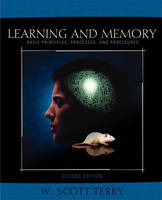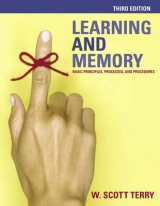
Learning and Memory
Routledge (Verlag)
978-0-205-35462-7 (ISBN)
- Titel erscheint in neuer Auflage
- Artikel merken
Each chapter includes “Introduction,” “Summary,” and “Box.”
1. Introduction.
The Origins of the Study of Learning.
The Definition of Learning.
The Learning/Performance Distinction.
The Relationship between the Terms “Learning” and “Memory.”
Basic and Applied Research.
Conceptual Approaches to the Study of Learning.
2. Habituation and Other Forms of Simple Stimulus Learning.
The Orienting Response.
Habituation.
Explanations of Habituation.
Other Effects of Stimulus Exposure.
Applications.
3. Classical Conditioning.
The Definition of Classical Conditioning.
Methods of Studying Classical Conditioning.
Basic Phenomena of Conditioning.
The Role of Contiguity.
Other Factors Affecting Conditioning.
What Is Learned in Classical Conditioning?
Extensions of Conditioning.
Applications of Conditioning.
4. Instrumental Learning: Reward.
Definition and History.
Methods of Study.
Positive Reinforcement.
Reinforcement Variables Affecting Acquisition.
Theories of Reinforcement.
Is Reinforcement Necessary for Learning?
Conscious Awareness in Human Instrumental Learning.
Criticisms of the Use of Reinforcement.
Response Learning.
Discriminative Stimulus Control.
What Is Learned in Instrumental Conditioning?
Applications.
5. Instrumental Conditioning: Nonreward, Punishment, and Avoidance.
Defining the Contingencies: Nonreward, Punishment, and Avoidance.
Nonreward.
Punishment.
Persistence.
Avoidance Learning.
Learned Helplessness.
Applications of Aversive Learning Contingencies.
6. Verbal Learning.
The Ebbinghaus Legacy.
Serial Learning.
Paired-Associate Learning.
Free Recall.
Available Versus Accessible Memories.
Relationships Among the Verbal-Learning Tasks.
Application: Mnemonics.
7. Human Memory: Conceptual Approaches.
Partitioning Memory.
Components of Memory Approach.
Stages of Memory.
Processing Approaches.
Connectionist Models.
Applications.
8. Short-Term Retention.
Definitions.
Short-Term Memory Tasks.
Characteristics of Verbal Short-Term Retention.
Other Modalities of Short-Term Memory.
Working Memory.
Is There Really a Separate STM?
Applications.
9. Encoding.
Separating Encoding from Retrieval.
Some Basic Variables in Encoding.
Presentation Variables.
Learner Variables.
Schemas.
Metamemory.
Applications.
10. Storage and Retrieval.
Storage.
Retrieval.
Remembering to Remember.
Metamemory and Partial Retrieval.
False Retrieval.
Retrieval versus Reconstruction.
Automatic Retrieval.
Applications.
11. Spatial, Motor-Skill, and Implicit Learning.
Spatial Learning.
Motor-Skills Learning.
Implicit Learning.
Expertise.
Applications.
12. Individual Differences in Learning and Memory.
The Nature of Nurture: The Genetics of Learning Ability.
Age Differences in Learning and Memory.
Intellectual Deficits.
Exceptional Memory: The Mnemonists.
Gender and Cognitive Abilities.
Personality and Learning.
Learning Styles.
Social and Cultural Differences.
References.
Index.
| Erscheint lt. Verlag | 8.10.2002 |
|---|---|
| Verlagsort | New York |
| Sprache | englisch |
| Maße | 243 x 196 mm |
| Gewicht | 923 g |
| Themenwelt | Geisteswissenschaften ► Psychologie ► Allgemeine Psychologie |
| Geisteswissenschaften ► Psychologie ► Biopsychologie / Neurowissenschaften | |
| Geisteswissenschaften ► Psychologie ► Pädagogische Psychologie | |
| ISBN-10 | 0-205-35462-9 / 0205354629 |
| ISBN-13 | 978-0-205-35462-7 / 9780205354627 |
| Zustand | Neuware |
| Informationen gemäß Produktsicherheitsverordnung (GPSR) | |
| Haben Sie eine Frage zum Produkt? |
aus dem Bereich



